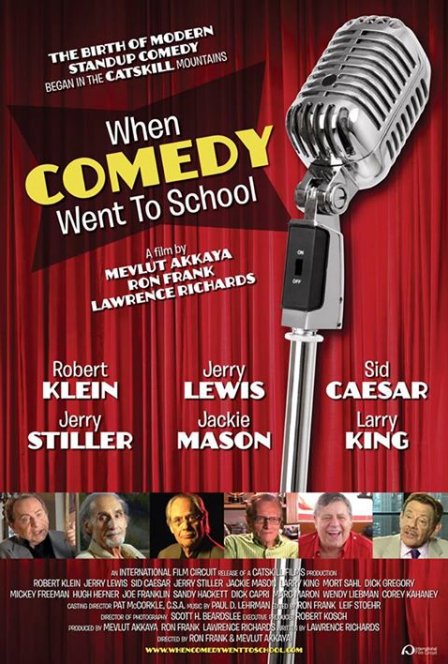Presenting a legendary entertainment figure or era to a modern audience is all about the legwork of establishing context. It’s not really enough to say, “He was the best, here is footage of him being the best,” because that places the subject in the tiny box of the archival material. There’s need for a curator to provide connections, humanity, and significance. Without this focus and commitment, an audience receives a muddied portrait, with little incentive to engage. So where When Comedy Went to School intends to serve as a love letter to the stature and influence of Catskills comedians, it falls very flat, offering instead a series of dated and simplistic portrayals that share little through-line.
The project plays out more like a hour-long TV retrospective (it’s also roughly that length) than a documentary film, with Robert Klein serving as host. His first line post-opening=credits, as he emerges from behind the curtain in an overtly neglected nightclub is, “This stage doesn’t look like much now…” It feels a lot like a parody of the form, and while it’s palatable or at least ignorable at first, you will be worn down by lines like, “Exactly what is a comedian? Wikipedia — funny name for an encyclopedia, but hey, it’s free! Wikipedia defines a comedian as…” It’s not that the movie has a responsibility to be cutting-edge, or adhere to a specific tone or comedic sensibility. But surely, though, someone could have at least looked at the line in the script where the host reads the Wikipedia definition of “comedian” and thought “Hey, maybe this isn’t a necessary thing to include.”
Further illustration of a confusing disconnect between the creators’ intent and what they delivered can be gathered from the “Filmmaker’s Statements” section of the film’s website: “Along the way, we discovered some very personal moments: Jerry Lewis told us how he started out as a six year old kid who was frightened onstage by an exploding light bulb. He realized, for the first time, that it was his reaction that made the audience the laugh.” First of all, that’s not very personal. Jerry Lewis is perhaps the most lucid and insightful interview present in the movie, and he uses this story, not as an intimate disclosure, but to explain the genesis of his understanding and love for comedy. It’s relatable. It’s entertaining. It’s aware of its audience. It’s what the whole movie should’ve been like.
“In an extremely emotional moment, 86-year-old Sid Caesar watched newly discovered archival footage of himself in the Catskills from 50 years ago.” This scene in question lasts all of six seconds, essentially present as one clip of b-roll in a larger montage. Sid Caesar watches a laptop and smiles, as his wife points to it, saying something to the effect of “there we are.” It’s about as poignant as a Hoveround commercial. Maybe this was “extremely emotional” in person, but it certainly isn’t in the end product. You could miss it altogether if you sneezed at the wrong time.
“Larry King worked as a hotel busboy, dreamed of being a comedian, and revealed a secret intimate moment with a married woman.” It’s tough to decide what is more baffling about this: The actual scene, in which a smirking Larry King relates this story, apropos of nothing, over footage of a baseball diamond, his tale punctuated by a (artificially inserted?) clap of thunder, or the fact that the filmmakers considered this not only relevant enough to the narrative to include in the final movie, but important enough to include in a list of key “personal moments.” The lack of refinement somehow gives the simultaneous feelings that the good stuff wound up on the cutting room floor, and that no edits were made whatsoever.
There’s no reason to believe that the parties involved in creating When Comedy Went to School didn’t have the firsthand knowledge and the legitimate passion for the subject necessary to make the project a success. Where they stumbled was in how to construct a documentary. Hearing Sid Caesar and Mort Sahl and Jackie Mason describe what it was like working in the breeding ground of modern stand-up is an exciting prospect. We barely receive this gratification, though. The film constantly meanders towards descriptions of hotel menu items and vague, half-pursued ideas of how a historical precedent of persecution has informed Jewish comedy. There is a relentless use of cheesy re-enactment footage, much of which is used multiple times. The final moments are scored by a rendition of “Send in the Clowns,” which causes Robert Klein to remark, “The way the world is today, we should always be asking… where are the clowns?” It’s almost an incredible feat, that a documentary about 70-year-old comedians somehow manages to be way more dated and out-of-touch than its subjects. Disappointing, too, is that for a film titled When Comedy Went to School, the audience learns almost nothing.

